Traveling Under Trump

On November 8th, 2016 many Americans wished they were a world away. I actually was. And it sucked.
As the east coast of the U.S. settled down for a long night of listening to Wolf Blitzer painstakingly cite voting totals, I was driving a “Deucey” camper van with my wife Allie up the west coast of New Zealand’s southern island.
One doesn’t appreciate how much the presidential election is one of America’s last true communal events until you’re in one of the world’s most isolated nations with no cell phone service. With no Twitter and no CNN to provide the soothing drip of state-by-state results. I got so desperate I called into the national news radio station for New Zealand.
I forget what I asked, but I remember being dissatisfied with their answer as they were clearly getting all of their info from American CNN in the background. Turns out, a random New Zealand talk radio show didn’t know about the intricacies of U.S. electoral politics. To be fair, I still can’t name their prime minister. We’ll call that a draw.
Throughout the trip, we had a quest to figure out the universal “Trump Number.” It was the average amount of time it would take someone to ask about Donald Trump after hearing our accents or asking where we were from. We ended up visiting 10 countries in five-months and the unscientific standard Trump number was somewhere around 60 seconds.
Before the election, I was often tapped to explain how Mr. Trump made it this far. I would talk about the plight of Americans who haven’t seen their income rise in decades. Or those that watched their towns hollow out after jobs left. Or the lack of accountability from the financial crises. The kind of stuff that’s bordering on cliché as the explanations for November 8th harden from theories into narratives into history and all of the thinkpieces and rushed book deals that come with it. Americans are rational just like you, 40-year-old Chinese teacher, I swear.
I also got it from the other side, when I would be not-so-subtly scolded for my home country. Like one taxi driver in Sydney, who wondered why the U.S. media was so biased against Trump when he had sensible ideas. Later another Australian would ask me why U.S. race relations are so bad.
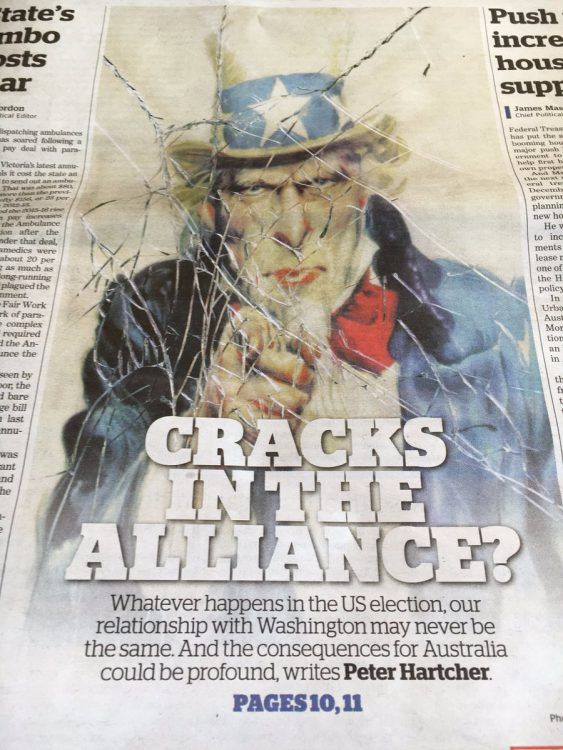
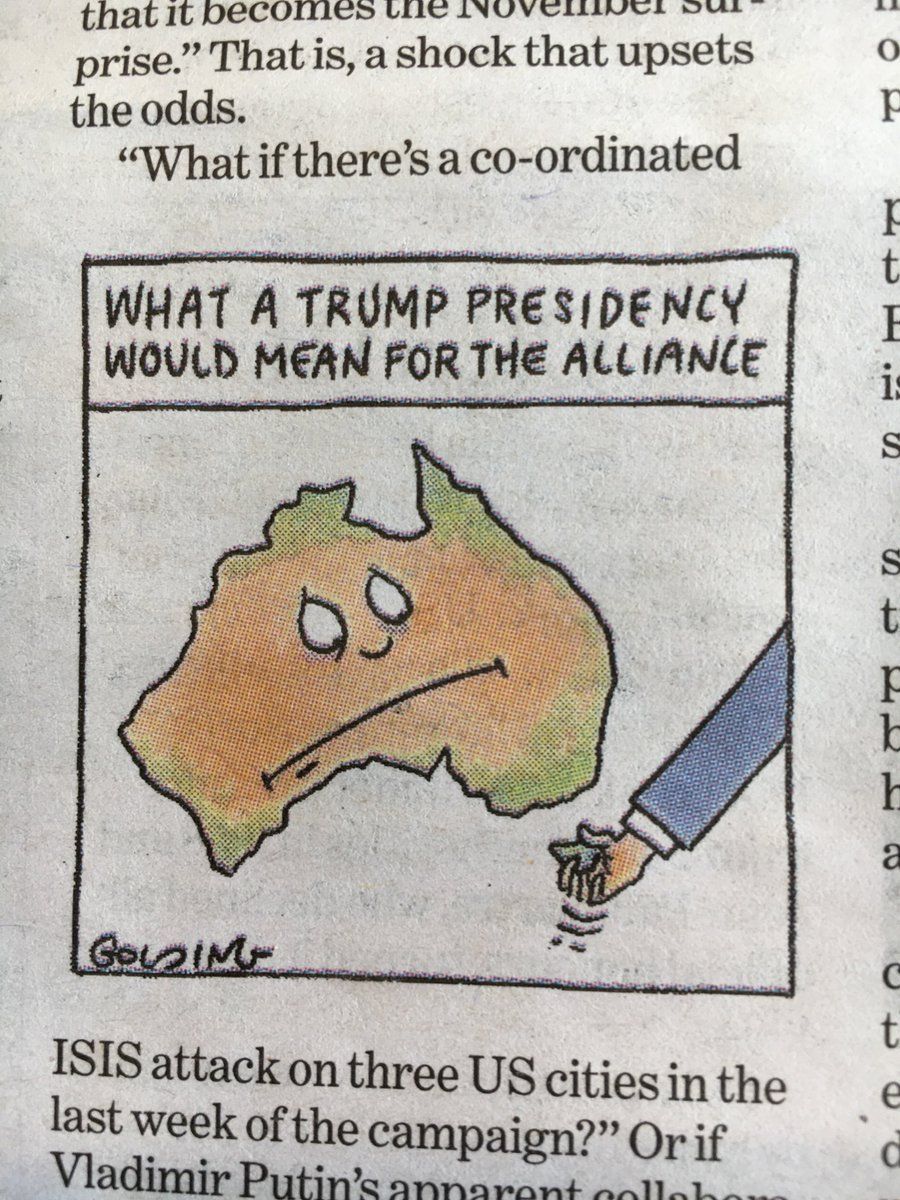
My favorite was meeting people from the UK who were mentally struggling with their curiosity of Trump but no so much that they wanted to leave themselves open to the obvious counter Brexit question. (That is, until we met a British couple, one a nurse, in Windhoek, Namibia that hated the NHS and thought Barack Obama ruined foreign policy for the US. They voted Leave.)
The line of inquiry was usually born out of pure curiosity. After being bombarded with news from an election a world away, here before them stood an actual American. I, in turn, enjoyed the process. I’m one of those people that believe in American exceptionalism, that America is an imperfect but beautiful idea. And it was fun to have skeptics push me on that belief, adding to my understanding of my home country.
Whether it was in Oceania, Southeast Asia, or Africa, we were dramatically out-numbered by Europeans, Russians, and Chinese almost everywhere we went — and I gathered that those areas of the world interacted with America mostly through the news and Friends reruns. It was fun to chat about. We had saved for this trip for years and I always kind of day dreamed about having a fake, tongue-in-cheek U.S.-versus-the-world debate over a beer with a stranger, laughing about it, and becoming fast friends.
Then the election happened.
***
Arriving in Mapua, New Zealand on election “night” we walked past the horse race betting parlor and went to bar to bar to see if they had TV with the election. None did, so we found the one with the best wifi, ordered some nachos (the most American dish available) and watched the election results come on our laptops while seated in some faux-upholstered easy chairs. Sort of like the kind the guy sits in during Masterpiece Theater.
The bartender tells me she’s been “nervous all day.” Eventually Florida goes red and it becomes clear what’s happening. I order a few more Jack and Cokes. Allie and I avoid looking at one another as we refreshed Twitter and watched livestreams of CNN. It was the Schrodinger’s cat of cataclysmic election results. If another American resident wasn’t around to see the results with me, it didn’t happen.
You probably don’t care about my politics. But, like you, I’m sure you care about the jolt that is our presidential election. That after all the polls and pundits, it’s a show of hands that can’t be spun. The result is the result. Thems the breaks, and this is who we are as a country. After November 8th, I wasn’t so sure who we were.
My adventures in international relations switched from being based on curiosity to being based on bewilderment. A few days later, while touring the hot sulfur springs in Rotorua, New Zealand, our sheepish college-age tour guide told us about a trip she wanted to take to Los Angeles. I smiled and told her about the great Mexican food and how you can tour all the movie sets. She responded by saying she didn’t think she was going to go because “of all that’s going on over there now.” She then continued with the tour like she didn’t just compare California to some war zone.
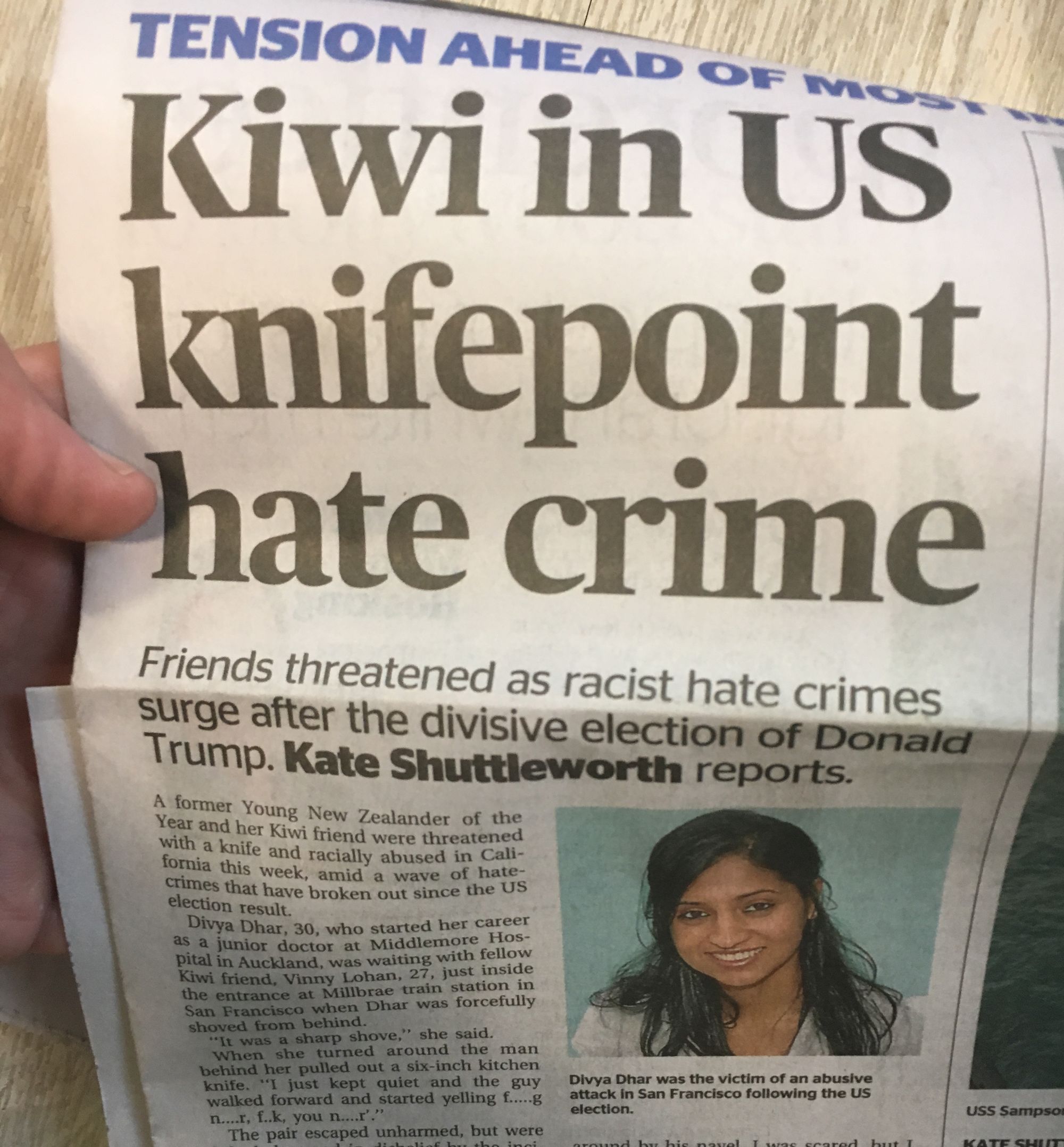
Each time we stopped for food on our road trip I’d thumb through a copy of the local newspaper. Seeing Brexit and Trump, many New Zealanders worried that “it could happen here.” Many thought it ought to. I checked into a campground for the night and was asked if I voted for Trump. He’d later say that the result made sense. After all, so many people work so hard for so little money.
Later that week while in Wellington, we slept through a 7.5 magnitude earthquake and awoke to frantic news reports instructing all residents to get away from water in case of a tsunami. We were parked in a marina.
While NZ talk radio thankfully shifted to being all earthquake all the time, Twitter, my main means of staying abreast of news became all Trump all the time, and increasingly manic. Some super lefty friends from Philadelphia and New York were hoping the electoral college would subvert democracy. Which, for the record, was a crazy idea.
Meanwhile, my Trump-supporting friends were texting me about how they felt a giant relief that the country was in good hands now.
There were days where scandal de jour hopscotched from “fake news” to turnout to the FBI. Thanks to the time zones, while I slept, entire narratives would be built and then destroyed or denied. In rare cases they would be elevated to multi-day scandal. That is, until the next Trump tweet. Today’s top story: the electoral college would not let this happen. Today’s top story: our President was going to put his assets in a blind trust for real. Today’s top story: his inauguration crowd was the biggest. Each news cycle came to me all at once after I woke up. And each time it was like a movie that ended right before the climax. YOU MEAN WE NEVER FIGURED OUT WHY OUR PRESIDENT-ELECT THINKS MILLIONS OF PEOPLE VOTED ILLEGALLY? THIS SEEMS IMPORTANT.
I saw entire dustups with no resolution. I wanted more information but it was 3 am in Washington D.C., so I’d have to wait. And then the next day, everyone would be talking about the next thing. Wait, I thought yesterday was the worst thing ever? Now we’re on to this new thing?
It became clear: No one is getting what they want, nobody was all that interested in self-reflection, and this was only going to accelerate.
From afar, it seemed like America was in chaos. For all I knew, people were stocking up on canned goods and firearms in anticipation of something awful. One of my friends would later tell me he actually did purchase two guns. More for burglary than a massive government crackdown, but still. I was perplexed.
Meanwhile, I was touring the Hobbit village movie set and the cognitive dissonance started to get to me. My love for my country was shaken, not by the election’s result but by the total bifurcation of how that result was interpreted. There were a lot of reasons a former reality TV star is our president. I found myself identifying with the coverage of “The Trump voter”: I spent most of childhood in one of those towns where several of the big employers picked up and left. Members of my family have succumbed to opioids. Many friends haven’t had a raise in… ever.
I also found myself identifying with the Trump protester. Our president was an unserious man in a serious time saying awful things. Our leader didn’t know anything about anything. How the hell could anyone think this is okay? I felt I was experiencing the pain of both sides, one tweet and text at time. Drip. Drip.
Whew, finally time to tune out from the news for a bit and do some unrelated reading to refresh mys-- GOD DAMMIT pic.twitter.com/g0cE7YUqha
— Sean Blanda (@SeanBlanda) November 25, 2016
Utterly disillusioned by late November, I deleted Twitter from my phone and boarded a flight to the Philippines who had been dealing with their own populist strongman in Rodrigo Duterte. I’m not going to pretend to have an intimate understanding of Filipino politics but the similarities were hard to ignore. Both men were outspoken self-styled tough guys looking to upend the establishment. Except Duterte was sanctioning murder of those suspected to be connected with the drug trade. From our hotel room in Cebu we watched a news report about a young child who had been caught in the crossfire.
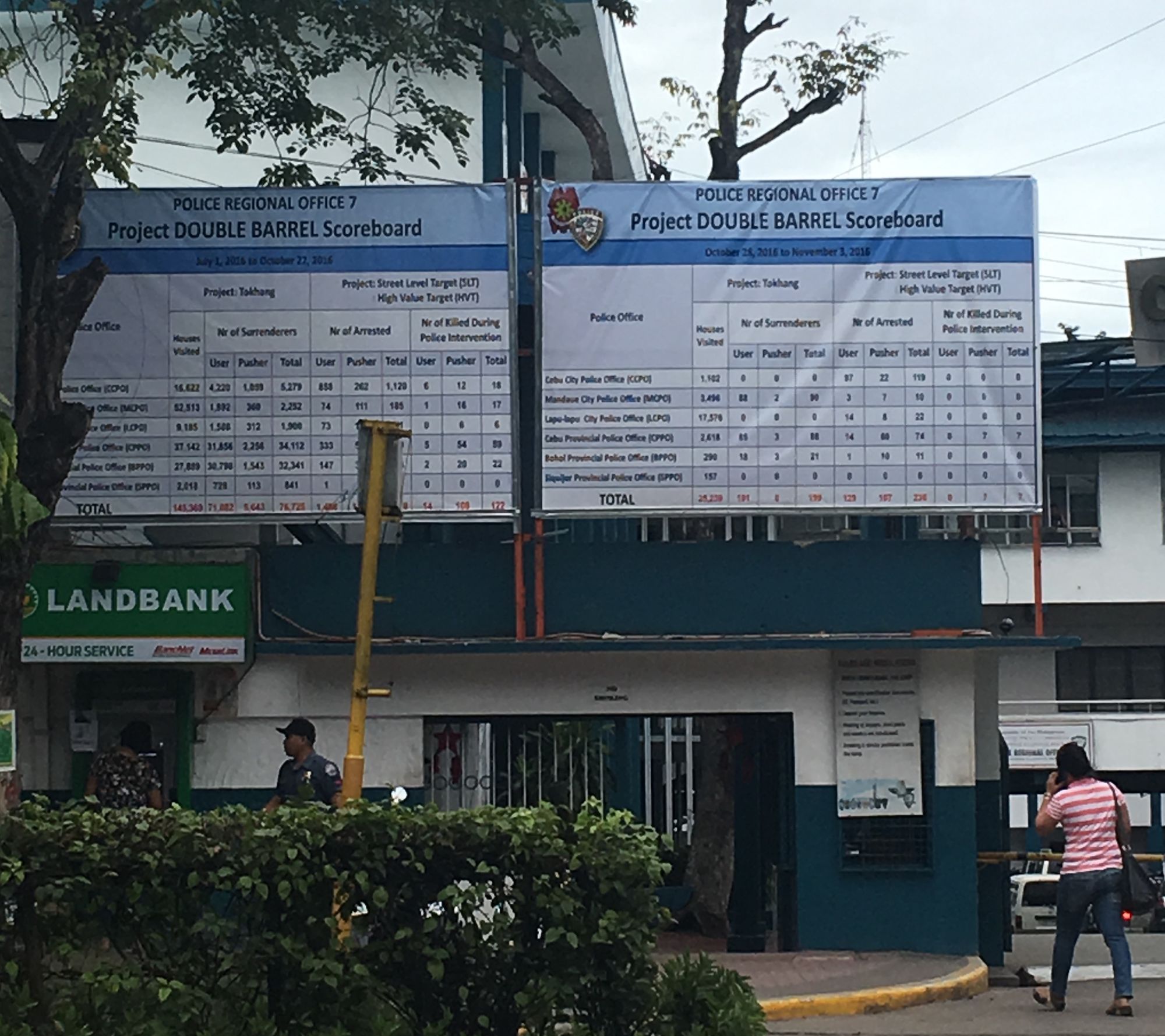
With somewhat of a language barrier, most Filipinos we met didn’t ask us about Trump. But the division over Duterte was everywhere. As we drove out of Cebu city, a long wall on the side of the highway was covered in graffiti, both the pretty urban art kind and the less-pleasing black tagging. At the end of the wall the artist wrote in English something along the lines of: “I hope Duterte doesn’t kill me for my art.” I found myself oddly optimistic at this minor protest.

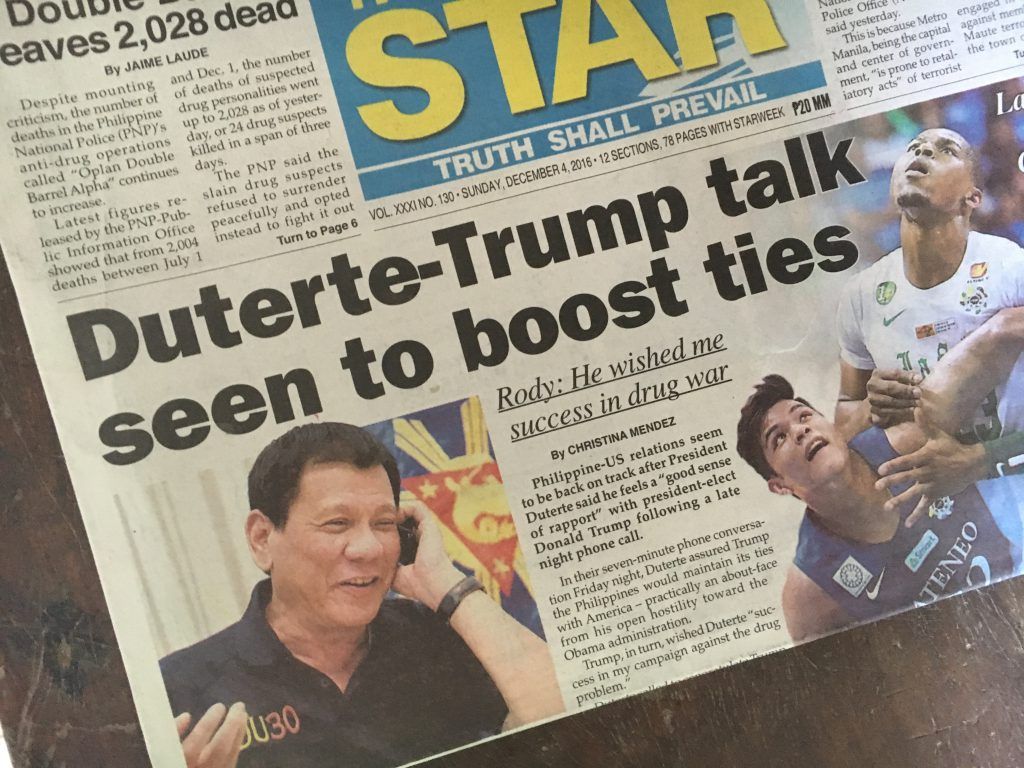
Driving across Cebu island we passed town after town, many with no modern buildings other than a Jollibee chicken. But every now and then a cinderblock home with no floor would have a whet-pasted Duterte poster.
Arriving in Santander a few days later we hoped to rent a scooter to get around, but realized there were no scooter shops. We walked into town and asked everyone we ran into where we could get one. Most shrugged. Some pointed down the road to a rental place we never could quite locate.
By the dock a group of teenage boys misunderstood my question and handed us the scooter one of them was sitting on. “How long?” He said, offering his current form of transportation to complete strangers without even discussing the price.
Allie eventually spotted a repair shop, one where a young boy was taking a wrench to a beat up red scooter. Ah, a repair shop. Surely they would know. The boy fetched his father whose name was Don and he had seriously injured his right hand so he shook my hand with the opposite side. Does he rent scooters? He paused grabbed a calculator, debated with his son and then showed us a number for a 72-hour rental. He didn’t normally do this, but why not make a buck? With no collateral and no down payment he handed us the scooter his son had been fixing and we drove away.

It was rickety and had trouble getting from 1st to 2nd but it worked. Despite all of the bad news coming out of the Philippines two complete strangers offered us a machine that cost thousands of dollars with no pretense. I started to feel a bit better about the world. America, on the other hand, we still had some soul searching to do.
As we traveled from Philippines to Hong Kong to SE Asia to Africa, our level of political engagement depended on the language barrier. But if someone spoke English, it was coming up. When we arrived in Namibia in February, we took a six-day long tour around the country with six Chinese women, an elderly British couple, and two German women in their 30s. Two Namibian drivers rounded out the tiny international experiment.

I was in the Namibian desert when the news broke: The United States was immediately banning people from seven countries from entering the country. Effective immediately. The ban included Green Card holders, like my wife. It included visa holders like many folks I’d worked with at my last job. The hotel TV had CNN on loop while everyone ate dinner and I had a moment of panic. I couldn’t understand how anyone, anywhere would think that this was a good idea. I used what little cell service we could get to donate to the ACLU. Did that even help? Here I was, relaxing on a trip while some of my friends were spending their Sundays protesting.
It's so depressing that half the country takes delight in pain of other half. That hurting political opposition more imp. than any policy.
— Sean Blanda (@SeanBlanda) January 28, 2017
I had spent weeks in the run up to the travel ban telling anyone that asked how America was a good place. A hard point to keep making as families are shown hysterically crying in the airport after a family member was detained. The six Chinese women would glance at the TV occasionally. Earlier that evening they told us that the reason China was so polluted is that the factories in America sent over the smog. America was a good place, I insisted to myself, reveling in how they were brainwashed. But then again…
The next morning we awoke and a clip was circulating of a government lawyer poorly arguing the ban in court. Images of airport protests replaced all of the crying families. We hopped into our car to drive across the desert to our next location with no cell service. I felt like anything could happen when we arrived on the other side. I spend an embarrassing amount of time at a rest stop trying to use their broken wifi to get some kind of news. Would they overturn the ban? Will all my rah-rah American defenses be justified? Can you just reset the router please?
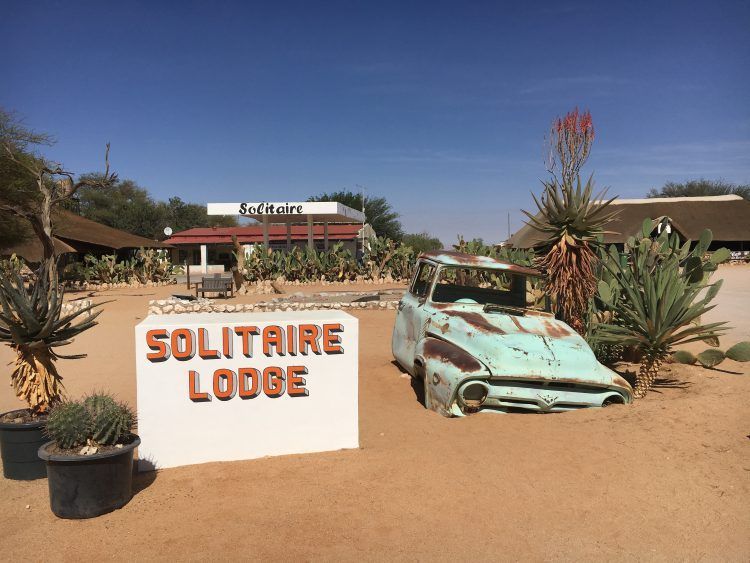
On the ride, our German friends told us about Cologne and we should visit there. We just might, we said. Meanwhile, elderly British couple had traveled all around the world and were extremely well-read on American politics. They voted Leave. It was about sovereignty and the NHS they said. They didn’t regret it one bit. I told them this travel ban isn’t what America was about. The husband nodded. One at a time, I’d convince them.
***
For our last city, we decided to go to Cologne, Germany to visit our buddy, and to see a high school friend of my wife who happened to live there.
At a dinner party there, the Trump number waited until wine. One of the men started talking to me about the upcoming German election. He saw Brexit, he saw Trump. Maybe Germany was next, because some people weren’t sharing in the prosperity. And that’s why he understood what was happening in the U.S. “I keep telling my friends, Americans aren’t stupid. They know what they’re doing.” I got him another beer.
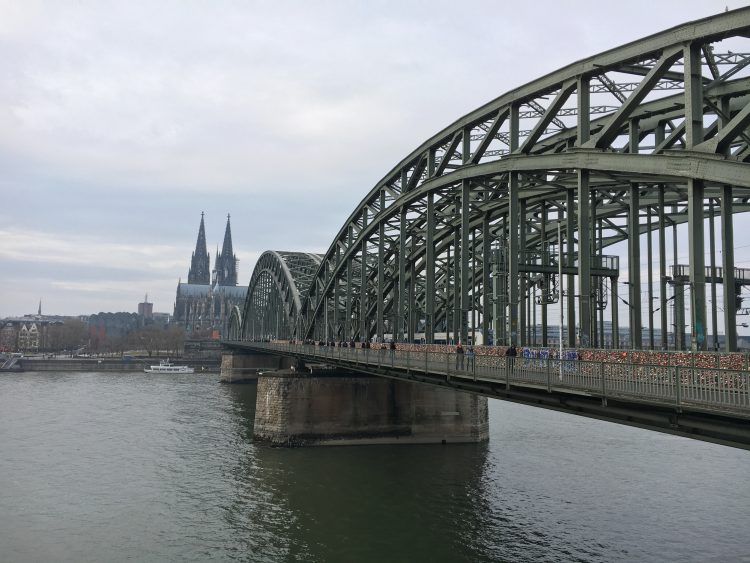
On the last night of our trip we settled into a German bar and invited our friend from Namibia. It was good to see her in her home city. After she arrived we caught her up on all that happened after we had met in the desert. We went to Cape Town, we said. We drank wine, we climbed Table Mountain. It was exciting but we were ready to go home and see our friends, our family, and our country.
The travel ban had been overturned. A protest culture had been brewing. Maybe we’d get home to some new politically active America, one where tough but long-needed conversations were happening and we’d have a chance to help shape that. That was enough of a cause for optimism. Generations of the past all had a role in shaping America. Maybe it was our turn now.
As we hugged our German friend one last time I made sure to reciprocate her previous offer to us. “If you ever come to the U.S. please let us know, we’d love to show you around!” She smiled. “I’d love to! That would be really fun.” She quickly added, “maybe in four years or so.”